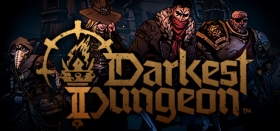
Darkest Dungeon II Review
Darkest Dungeon is an evil game: unendingly brutal and feels as though it has no respect for the player. While this may sound negative, this is all a part of its charm, and while Darkest Dungeon II carries across many of these same feelings, much of this charm seems to have been traded out for easier accessibility. A double-edged sword, as the game is much better tuned for average players; it definitely lost a lot of the originality the first title held.
The most notable thing about Darkest Dungeon II is the absolutely stellar visuals, blending a gorgeous gothic art style with very impressive 3D effects, giving an almost pop-up book-esque style. This also helps to manage the incredibly thick atmosphere: everything across the world looks absolutely miserable, and the player’s only solace is the fire, and the Inns, which are few and far between. The sound design is remarkably deep, with low and looming ambient tracks as the player travels throughout the many different locales, along with intense orchestral tracks in combat scenarios. The story, while relatively light for the most part, does manage to carry some fantastically well-realised themes, such as occultism and cosmic horror, which is well portrayed by the fully voiced narration, which reveals morsels of the plot at the beginning of each run.

Darkest Dungeon II is a roguelite RPG in which the player must form a party of four different heroes to journey across the land towards a mysterious mountain, where the boss of each of the five confessions (campaigns) are located. The heroes travel across the land in a stagecoach, which is protected by a flame that must be maintained, and come across a variety of events and battles. Combat encounters are the most notable of these. Creature Den’s are battles where the player’s party must engage a group of creatures, unique to these Dens. Upon completion, the player is awarded a variety of items, including creature parts, which can be traded in upon reaching the next Inn, in exchange for unique rewards. There are also Lairs which are multi-stage encounters with scaling rewards. After each wave, the player is given the option to either escape with the rewards, or advance to a harder battle for more loot. The third fight is always a boss fight, unique to the location, and if defeated, gives a plethora of rewards, most notably a trophy. Trophies all have unique effects, based on which boss it was taken from, and are also necessary to have equipped to gain access to the final boss. At the end of each area, the player gets a brief moment of respite at an Inn, where items can be purchased along with upgrades to the player’s skills, repairs to the stagecoach, and, the next route to be taken.
Combat, while relatively standard in the RPG space, is still very engaging due to a few interesting systems. Each hero has not only HP to manage but a stress metre as well, which can be increased by certain enemy attacks or other world events and even arguments with party members. When the stress metre maxes out, the hero has an 80% base chance to have a “Meltdown”. When this happens, it causes the affected hero’s HP to drop to 10%, lowers affinity with all other heroes, and reduces their resistance to any death blows (attacks that kill a hero at 0 HP). However, there is a 20% chance for the hero instead to become “Resolute”. In this state, the affected hero will heal 50% HP, receive a 50% increase to debuff resistances, and will increase their affinity with the other heroes. There are items and skills which can reduce stress, along with certain map events, such as oasis’, which reduce a select hero's stress. This can become a tough balancing act because many other miscellaneous actions in the game affect stress, such as choosing certain paths to progress, which will have differing effects on the party, increasing stress for some and decreasing it for others.

Each party member shares an affinity gauge with each of the other heroes, and through a variety of situations (such as buffing, defending party members, or making a decision), this affinity will either increase or decrease. Whenever the player exits an Inn, depending on the affinity, there is a chance that a bond will be made between two heroes, either positive or negative. These will add additional effects to hero's skills, which affect the other hero when used and vice versa. Balancing these two systems can be very tricky, as oftentimes there isn’t ever a truly safe option, leading to a lot of very interesting and thought-provoking moments of risk management. The stress system ties itself in well here, as relationships can be affected by stress levels, such as arguments breaking out at high stress, reducing affinity. There are 12 different classes of heroes, which all have different strengths and weaknesses, this leads to a vast amount of variety in party composition.
The game’s biggest downfall for me, however, came in the form of its meta-progression, which was a huge departure from the previous game. Being able to unlock new items and upgrades no matter how well the previous run went allows for a constant feel of progression and minimises the pain of loss. This, in theory, is a good change, but overcoming these challenges and learning how to outmanoeuvre different situations with unique and interesting play-styles was one of Darkest Dungeon’s most interesting and standout mechanics. Darkest Dungeon II seems to have thrown the majority of that away, in favour of a much more accessible and straightforward progression system.

Darkest Dungeon II (Reviewed on Windows)
This game is great, with minimal or no negatives.
A great game in its own right, with a healthy plethora of content and variety to keep you going for many hours, but if you came looking for a true Darkest Dungeon sequel you may be disappointed.









COMMENTS